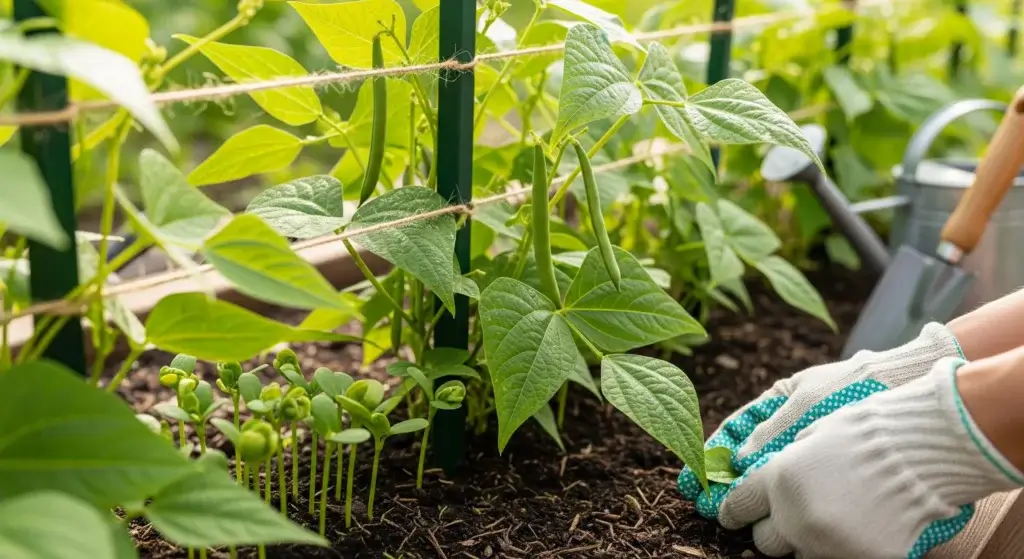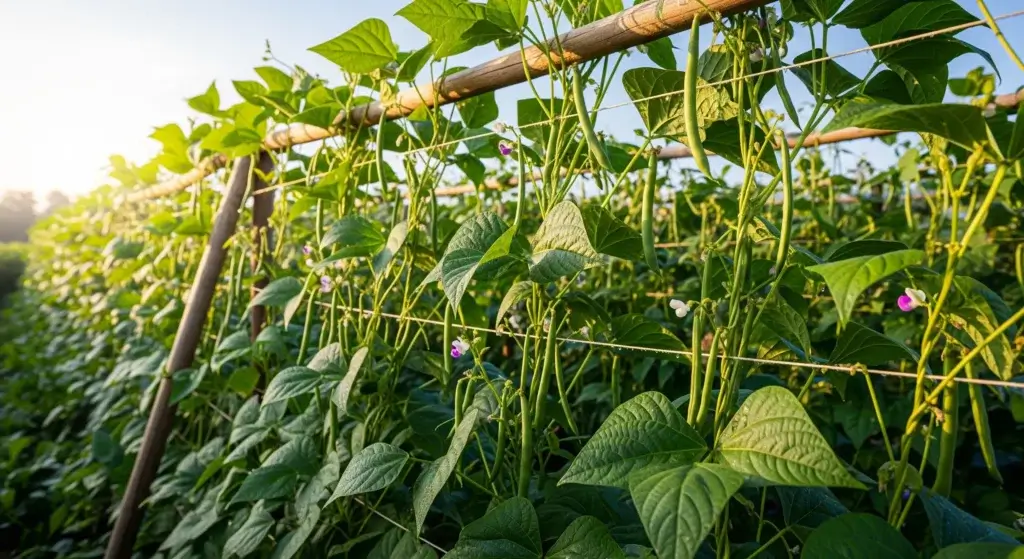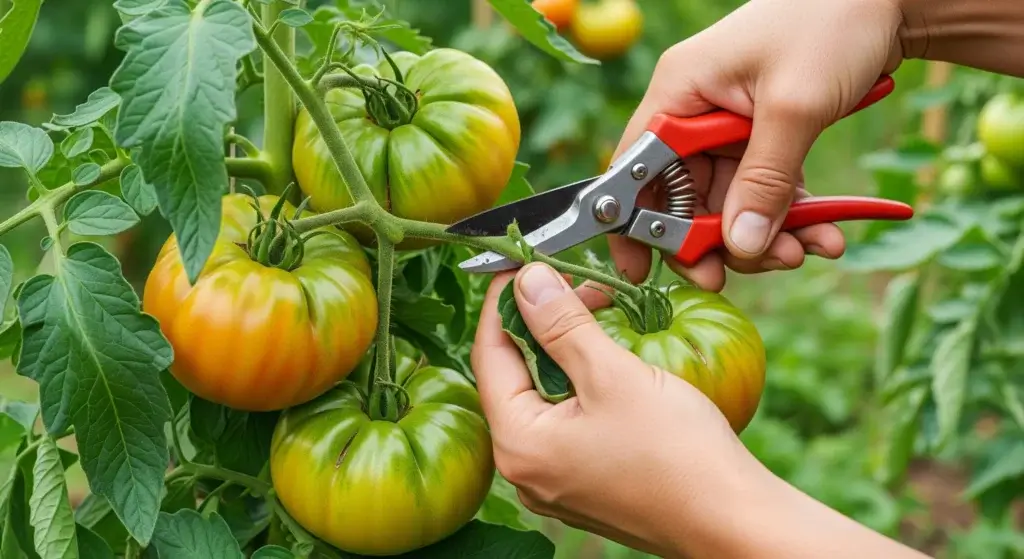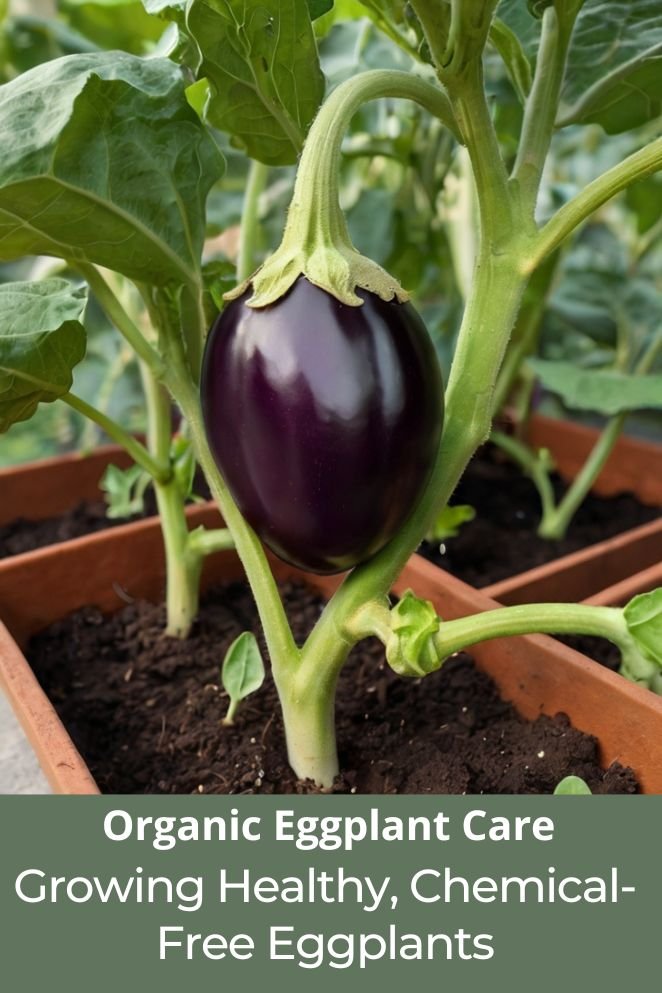
Eggplants are a delicious and versatile vegetable that can easily be grown in your garden.
But if you’re looking for the healthiest way to grow them, organic eggplant care is the way to go.
Organic gardening not only produces healthier, tastier vegetables but also helps protect the environment by avoiding synthetic chemicals and fertilizers.
About Organic Plants
Organic plants are grown without the use of synthetic pesticides, herbicides, or fertilizers.
Instead of relying on chemicals, organic gardening focuses on natural methods to promote plant health and fertility.
This includes using compost, organic fertilizers, and natural pest control methods.
When you grow eggplants organically, you’re not just avoiding harmful chemicals.
You’re also helping the soil and surrounding ecosystem thrive.
Organic gardening encourages biodiversity, improves soil structure, and ensures that your eggplants are as natural and nutrient rich as possible.
Organic Plant Care
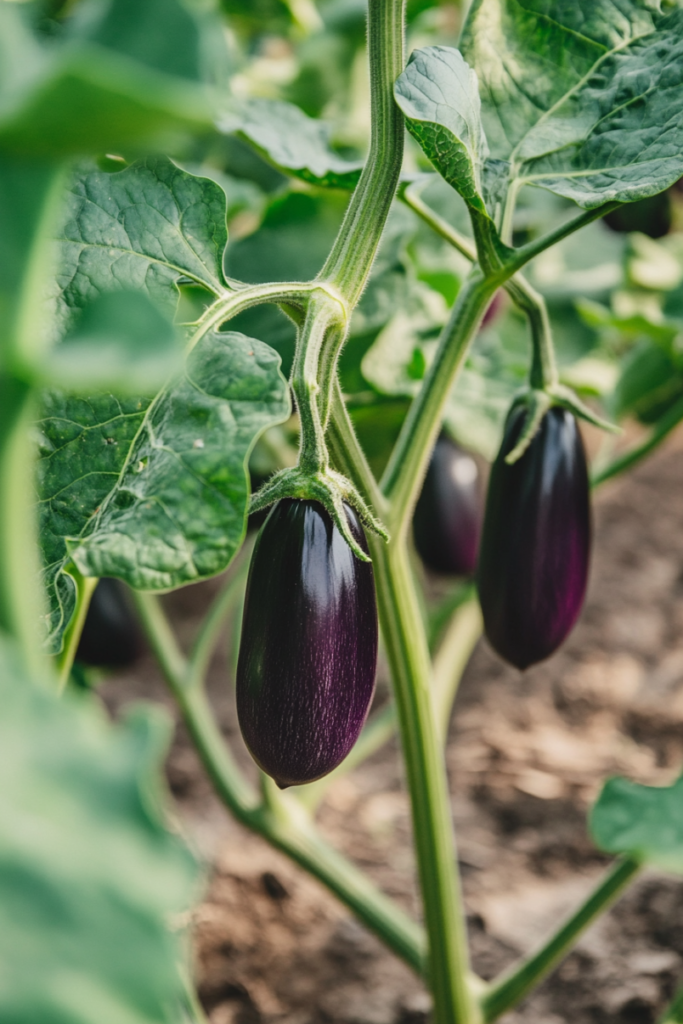
Organic plant care is all about creating a healthy, balanced environment where plants can thrive without the use of synthetic chemicals.
This involves nurturing the soil, managing pests naturally, conserving water, and promoting a biodiverse ecosystem.
Let’s break down what organic plant care entails in more detail:
Soil health
Healthy soil is the foundation of successful organic gardening.
In organic plant care, instead of relying on chemical fertilizers, you enrich the soil with natural materials that improve its structure and nutrient content.
Here’s how:
- Organic matter: Adding organic matter, such as compost, leaf mold, or well-rotted manure, improves soil fertility. Organic matter breaks down slowly over time, releasing nutrients that plants need for healthy growth. It also improves the soil’s ability to retain moisture and promotes a healthy root system.
- Natural fertilizers: Organic fertilizers, like bone meal, blood meal, or fish emulsion, provide essential nutrients such as nitrogen, phosphorus, and potassium. These natural fertilizers release nutrients slowly, feeding the plants over a longer period, which is healthier for both plants and soil.
- Soil structure: Organic matter also improves the texture of the soil, making it looser and more friable. This allows plant roots to penetrate more easily, improves drainage in heavy soils, and helps sandy soils retain more moisture.
Pest management
One of the most important aspects of organic plant care is avoiding synthetic pesticides.
Instead, organic gardeners use natural methods to keep pests under control.
Here are some of the key strategies:
- Companion planting: This involves planting certain crops together to deter pests naturally. For example, marigolds can repel aphids and nematodes, while basil can help keep mosquitoes and whiteflies away. By growing these plants near each other, you reduce the need for chemical pesticides.
- Beneficial insects: Some insects are natural predators to common garden pests. Ladybugs, for instance, eat aphids, and lacewings help control caterpillars and mites. Attracting these beneficial insects to your garden by planting flowers they like, such as dill or fennel, can help keep pest populations under control naturally.
- Natural sprays: If pests become a problem, you can use natural pest control sprays such as neem oil or insecticidal soap. These options are much safer for the environment and won’t harm beneficial insects or pollinators like bees.
Watering practices
Watering is a key part of plant care, but in organic gardening, it’s not just about providing enough water.
It’s about using water efficiently and ensuring plants develop strong, deep roots.
Here’s how organic plant care encourages smart watering practices:
- Mulching: Applying a layer of organic mulch, such as straw, leaves, or wood chips, around your plants helps conserve water by reducing evaporation. Mulch also keeps the soil cooler in the summer, suppresses weeds, and as it breaks down, adds more organic matter to the soil.
- Deep watering: Instead of shallow, frequent watering, organic gardeners encourage deep watering. This means watering less often but thoroughly, so the moisture reaches deeper into the soil. This practice encourages plants to develop strong, deep roots, making them more drought-resistant and healthier overall.
- Rainwater harvesting: Collecting rainwater is another sustainable practice in organic gardening. Rainwater is free of chemicals, like chlorine, which are often present in tap water, making it healthier for your plants.
Promoting biodiversity
Biodiversity is essential to organic gardening. A garden filled with a variety of plants, insects, and microorganisms creates a healthy, balanced ecosystem where plants can thrive.
Here’s how promoting biodiversity benefits your organic garden:
- Mixed planting: Growing a variety of plants in your garden helps attract beneficial insects and pollinators like bees and butterflies, which are essential for many crops to produce fruit. A mix of plants also helps keep pests at bay, as many insects prefer certain crops and are less likely to cause serious damage in a diverse garden.
- Crop rotation: Each type of plant uses different nutrients from the soil, so rotating crops each year helps prevent nutrient depletion. It also reduces the risk of soil-borne diseases that can build up when the same plant is grown in the same spot season after season.
- Supporting wildlife: Organic gardening supports more than just plants—it helps wildlife too. By avoiding harmful chemicals, you’re creating a safe environment for birds, bees, butterflies, and other beneficial creatures. Birds, for example, help control pests naturally, while bees are vital pollinators.
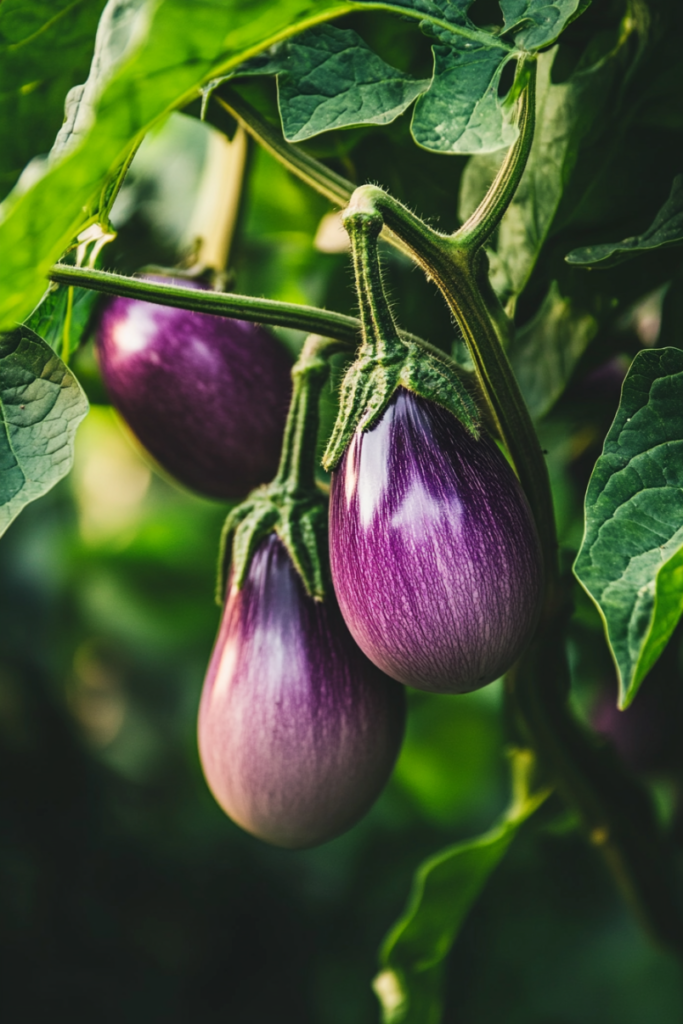
Soil Preparation
The foundation of a successful organic eggplant garden starts with the soil.
Eggplants love nutrient-rich, well-drained soil.
Preparing your soil properly will ensure that your plants have everything they need to grow healthy and strong.
- Check your soil pH: Eggplants prefer slightly acidic to neutral soil with a pH between 6.0 and 7.0. Before planting, it’s a good idea to test your soil’s pH. If your soil is too acidic, you can add lime to raise the pH. If it’s too alkaline, sulfur can help lower it.
- Add organic matter: Organic eggplants thrive in soil rich in organic matter. Compost is one of the best things you can add to your soil. It improves texture, retains moisture, and adds essential nutrients. Well-rotted manure is another great option. Spread a few inches of compost over your garden bed and work it into the top 12 inches of soil.
- Improve drainage: Eggplants don’t like soggy soil, so if your soil is heavy or clay-like, you’ll want to improve its drainage. Mixing in compost or sand can help break up heavy soil, allowing water to drain more freely.
- Use organic fertilizers: Eggplants are heavy feeders and will need a steady supply of nutrients to grow well. Organic fertilizers like blood meal, bone meal, or fish emulsion provide nitrogen, phosphorus, and potassium, all essential for plant growth. Work these fertilizers into the soil before planting to give your eggplants a good start.
Natural Pest Control
One of the biggest challenges in growing eggplants is managing pests.
But in organic gardening, we avoid synthetic pesticides and rely on natural methods to keep pests in check:
- Companion planting: Certain plants can help repel pests from your eggplants. For example, planting marigolds, basil, or nasturtiums nearby can deter pests like aphids and whiteflies. This method is called companion planting, and it’s a simple way to protect your eggplants without chemicals.
- Introduce beneficial insects: Encouraging beneficial insects, like ladybugs and lacewings, can naturally reduce pest populations. These helpful bugs eat common eggplant pests like aphids and spider mites. You can attract beneficial insects by planting a variety of flowering plants in your garden.
- Use natural sprays: If pests are becoming a problem, there are organic sprays you can use that won’t harm your plants or the environment. Neem oil, for example, is a natural pesticide that can control many common pests. Insecticidal soap is another safe option for treating infestations.
- Handpick pests: For larger pests like caterpillars or beetles, you can simply handpick them off your plants. While it might sound tedious, it’s an effective and chemical-free way to keep your plants healthy.
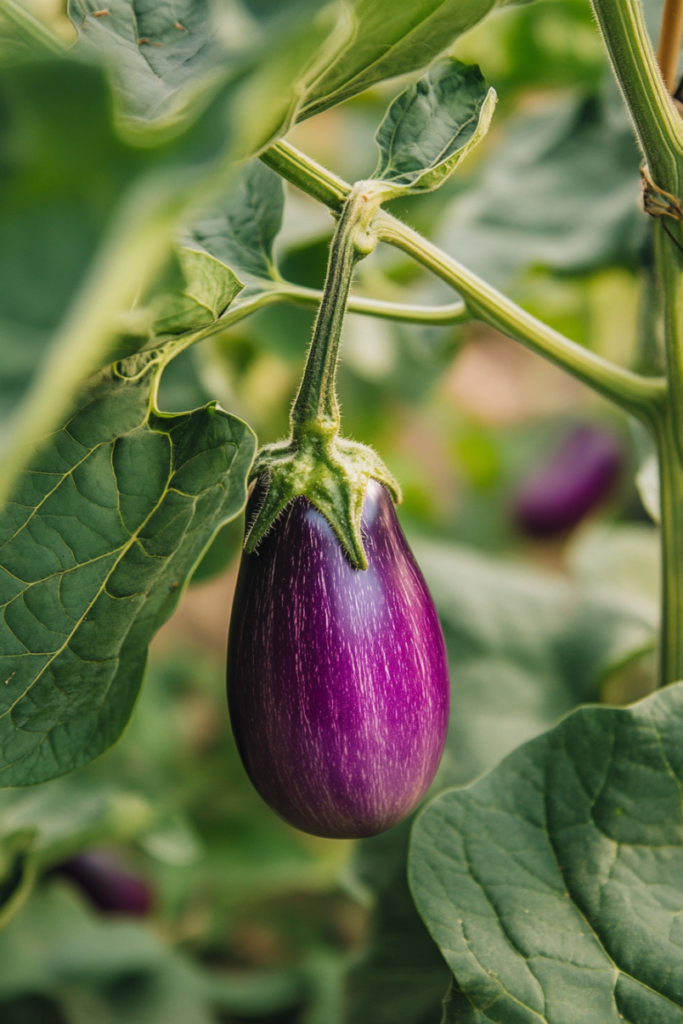
Conclusion
Organic eggplant care is all about creating a healthy environment for your plants.
By focusing on soil health, using natural pest control methods, and encouraging healthy growth, you’ll be rewarded with strong, productive plants that produce delicious, chemical-free eggplants.
Organic gardening takes a little more effort than conventional methods, but the results are well worth it.
Not only will your eggplants be healthier and more flavorful, but you’ll also be doing your part to protect the environment.
FAQs
Yes, you can use store-bought organic fertilizers. However, homemade compost or compost tea is a great option for organic gardening.
Overwatering, under-fertilizing, and neglecting pest control can lead to problems.

